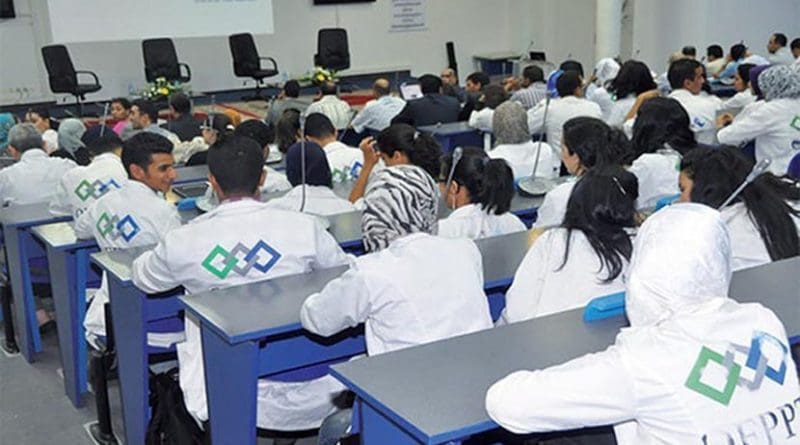Morocco: Career Focused Education And Training To Run Productive Sectors Of Economy – OpEd
Morocco has recently announced a shakeup of vocational education and training to ensure that more young people have real-life skills to match structural changes in the Moroccan economy.
To reach this ambitious goal King Mohammed VI presided over a meeting to with members of the cabinet to brief him on the strategy to upgrade and review vocational training.
During this session, the head of government presented to the King the draft of the program for upgrading the vocational training offer, elaborated by the cabinet on the basis of the royal guidelines.
After receiving details on the program’s components, HM the King stressed the need to focus on some related shortcomings and funding mechanisms and sources, reaffirming that the future promotion of the sector should take place under a complementary vision to reform the vocational training system by benefiting from successful international experiences in the field, notably the adoption of alternation between theoretical training and actual training inside businesses.
Afterwards, the head of government gave a presentation on the progress of preparations for the national meeting on training and employment.
In order to ensure the necessary conditions for the success of this important national meeting and to make it an ideal occasion to achieve a qualitative and fundamental leap in the correlation between training and employment, the King agreed with the Head of Government to postpone this forum to a later date.
In this context, the King urged to consider agriculture as a source of jobs and to integrate the territorial dimension, while taking into account the specificities and potentialities of each region.
Undoubtedly, Morocco has the potential to benefit from its young population. However, what is lacking nowadays is a coordinated strategy to give Moroccan youth employable skills. There is absolutely a major need for a more coordinated planning for the production of a skilled workforce required for economic growth.
Vocational training centers in Morocco offer non-formal trainings beyond the formal educational system under the Ministry of Education. As such, the qualification needs of disadvantaged persons can be fulfilled very flexibly. However what is missing is an institutional framework to organize, articulate, integrate, regulate and ensure the quality of training interventions and programs to suit demands and needs of potential employers.
Therefore, Morocco is in need to diversify and develop jobs and modernize pedagogical methods.
The meeting is in line with the implementation of the priorities and measures set by the monarch, especially in the Speeches on the Throne Day and Aug. 20. It mirrors the unwavering royal solicitude for the sector of vocational training as a strategic lever and a promising means to prepare youth for employment and professional integration.
In fact, in his speech dated Aug. 20, the King drew attention anew to the issue of youth employment, in relation mainly to the issue of balance between training and employment.
During the session, the King was informed about the propositions and measures to be taken by the concerned departments relating to the implementation of the royal instructions. They are mainly the restructuring of vocational training sectors, the creation of a new generation of training centers for young people, the systematisation of early guidance counseling to vocational sectors, the development of work-linked training, the learning of languages, as well as the promotion of youth entrepreneurship in their fields of competence.
The Sovereign gave his instructions for the development of new trainings in promising sectors and businesses, while upgrading training in the so-called traditional jobs, which remain the main providers of jobs for young people such as the sectors of industry, services, construction, agriculture, fisheries, water, energy and handicraft.
In this regard, King Mohammed VI has particularly emphasized the need to further develop the vocational training offer, by adopting new standards of quality, notably in the hotel and tourism sector so as to boost and back up the vital growth of this strategic sector.
The Royal attention also focused on vocational training in the health sector, including paramedical professions and health technicians, particularly in maintenance and repair of medical equipment where there is a real potential for jobs.
The sovereign has given his instructions to develop short-term skills trainings of about four months, integrating language and technical modules for people with experience in the informal sector, with a view to give them the opportunity to gain access to the formal sector and enhance their know-how and abilities.
Morocco is in need of a comprehensive approach in vocational training that will offer recipes for revamping the vocational system by making it demand-driven, and is inspired by international best practices for creation of skilled workforce on the basis of competence, rather than curricula-based training to face potential challenges for low‐skilled workers brought by skill‐biased technological changes and labour market conditions, which define the correlation between low‐skilled workers, employers and training opportunities
The Moroccan government should urgently develop a more comprehensive review of vocational training that should respond to concerns in the business community. Many young Moroccans are drifting into university education when a vocational education might be more convenient and useful. A comprehensive vocational education that will provide a skilled workforce to small businesses, national and international corporates.
The sector must be able to respond to future demands for higher skills, changing industry composition and structural change, especially in rural and urban regions and a skilled labor force working longer and in varied roles across their working lives.
In today’s knowledge driven and competitive global economy, Morocco should definitely elaborate a vocational training that will be a fundamental element in the development equation, because it will permit youth to unlock their potentials, expand their horizons and adapt to changes in the dynamic world we live in.

